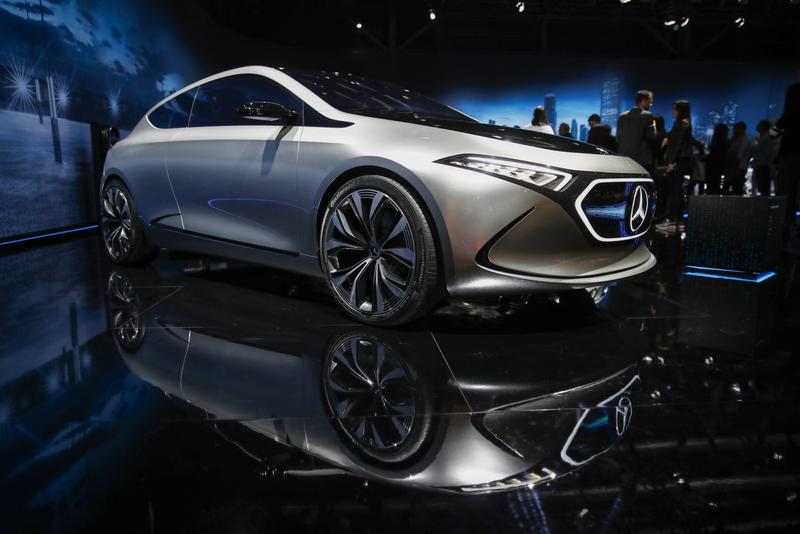 In this March 5, 2018 photo, a Mercedes-Benz Concept EQA automobile sits on display at a Mercedes Benz AG event ahead of the 88th Geneva International Motor Show in Geneva, Switzerland. (PHOTO / BLOOMBERG)
In this March 5, 2018 photo, a Mercedes-Benz Concept EQA automobile sits on display at a Mercedes Benz AG event ahead of the 88th Geneva International Motor Show in Geneva, Switzerland. (PHOTO / BLOOMBERG)
Mercedes-Benz is taking on one of the most complex industry challenges with the rollout of its battery-powered EQA: Selling small electric cars without a big profit squeeze.
Tesla Inc’s Model 3 or Volkswagen AG’s ID.3, Mercedes' EQA is based on technology from an existing combustion-engine car
The brand’s first fully electric compact model will hit European showrooms this spring, flanking the mid-size EQC sport-utility vehicle and the EQV van, the Daimler AG unit said ahead of the EQA’s unveiling on Wednesday.
Unlike Tesla Inc’s Model 3 or Volkswagen AG’s ID.3, the EQA is based on technology from an existing combustion-engine car. The German manufacturer modified the underpinnings of its GLA crossover to reduce upfront investments and save time compared to building an electric hatchback from scratch. It’s a trade-off that often comes at the expense of battery range and cost efficiency in production.
ALSO READ: Mercedes and BMW's dominance wanes as EVs ascend
The first generation of Mercedes’s lower-priced electric cars likely will drag on profitability until the company develops EV-specific underpinnings and battery prices drop further, said Michael Dean, a Bloomberg Intelligence analyst. Still, the company’s mass-market EV push will help it meet emissions rules in Europe and China, he said.
While the first Mercedes based on dedicated EV technology - the electric sibling of the full-size S-Class sedan - will be introduced later this year, a separate platform that will make producing small and mid-size battery-powered models more efficient is roughly four years away.
The world’s biggest luxury-car maker has little time to waste when it comes to bolstering its EV offerings. Surging demand for plug-in hybrids helped Daimler meet Europe’s CO2 targets in 2020, but it’s unclear how long subsidies for vehicles relying partially on combustion engines will last.
Rival factory
Elon Musk has signaled Tesla might start making a hatchback for Europe at its factory that’s under construction near Berlin, which would further up the pressure on domestic manufacturers.
Daimler Chief Executive Officer Ola Kallenius has pledged to focus more on larger luxury cars like the S-Class and GLS SUV to generate the funds needed for his electric-car shift. The EQA is targeted primarily toward young, urban customers and will be flanked by an all‑wheel drive version, Mercedes said.
READ MORE: Tesla's Model Y to emerge disruptor as China EV sales zoom
While it might take Mercedes until 2024 or 2025 to make competitive mass-market EVs, the manufacturer will likely “enjoy continued positive earnings momentum” as soon as sales of the new S-Class are kicking in, UBS Group AG analysts led by Patrick Hummel said in a note last week.


